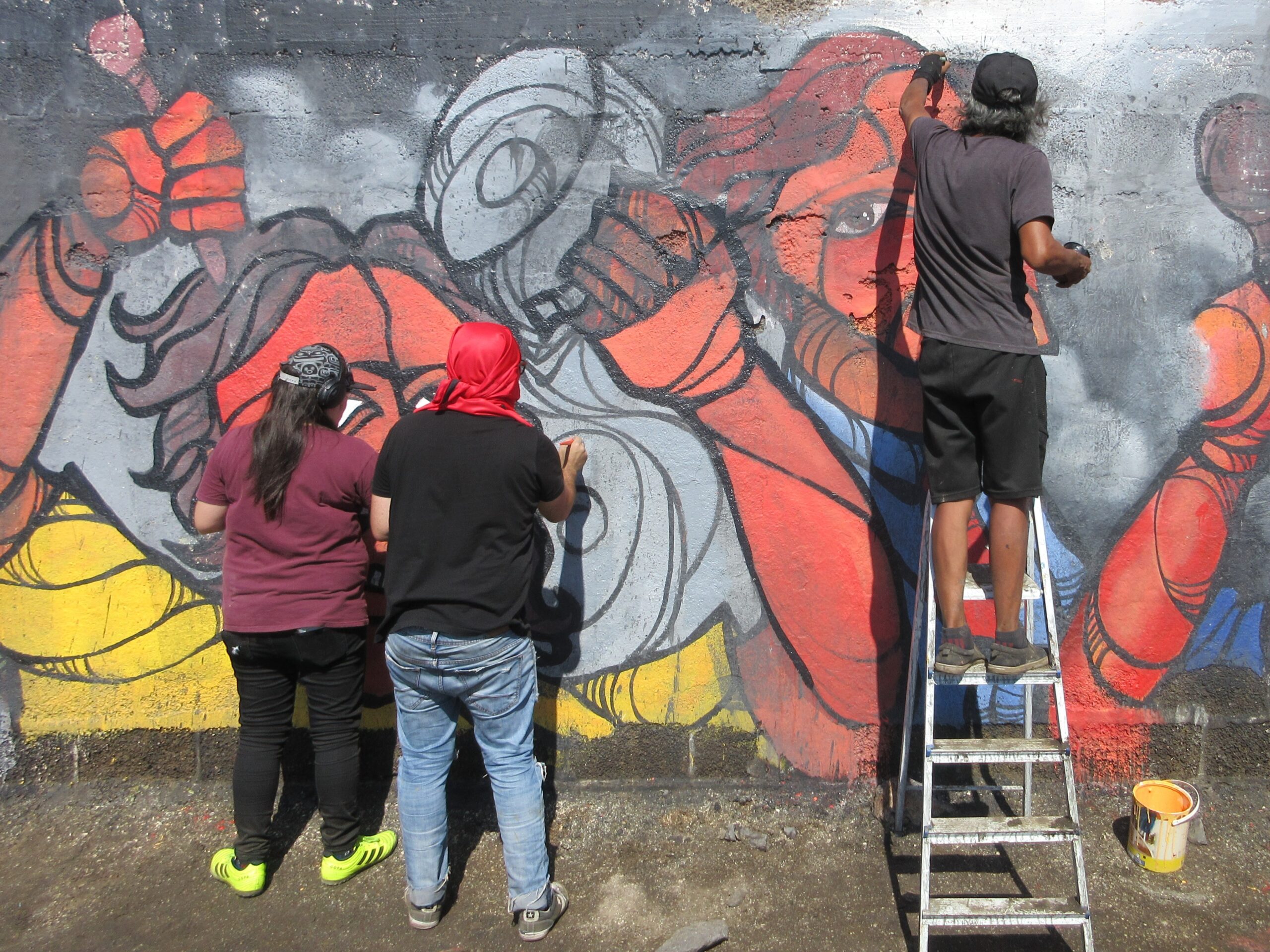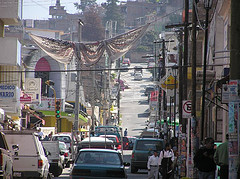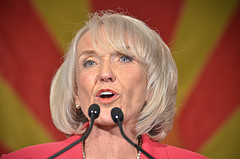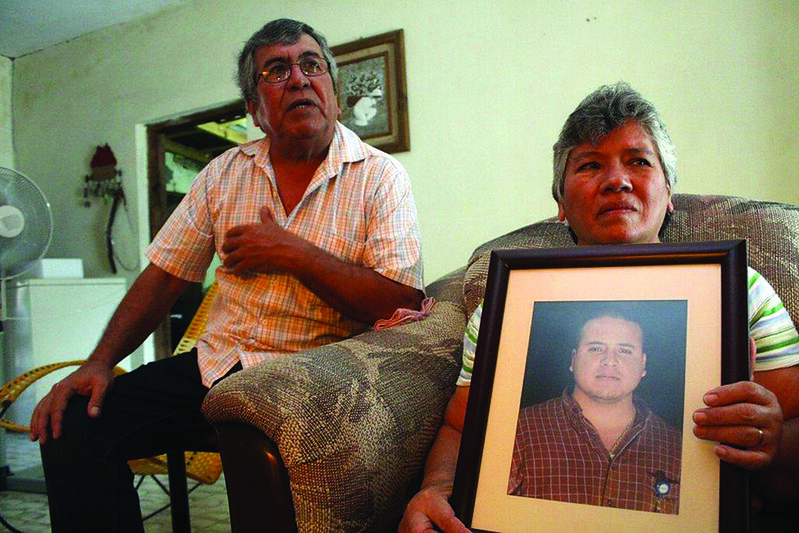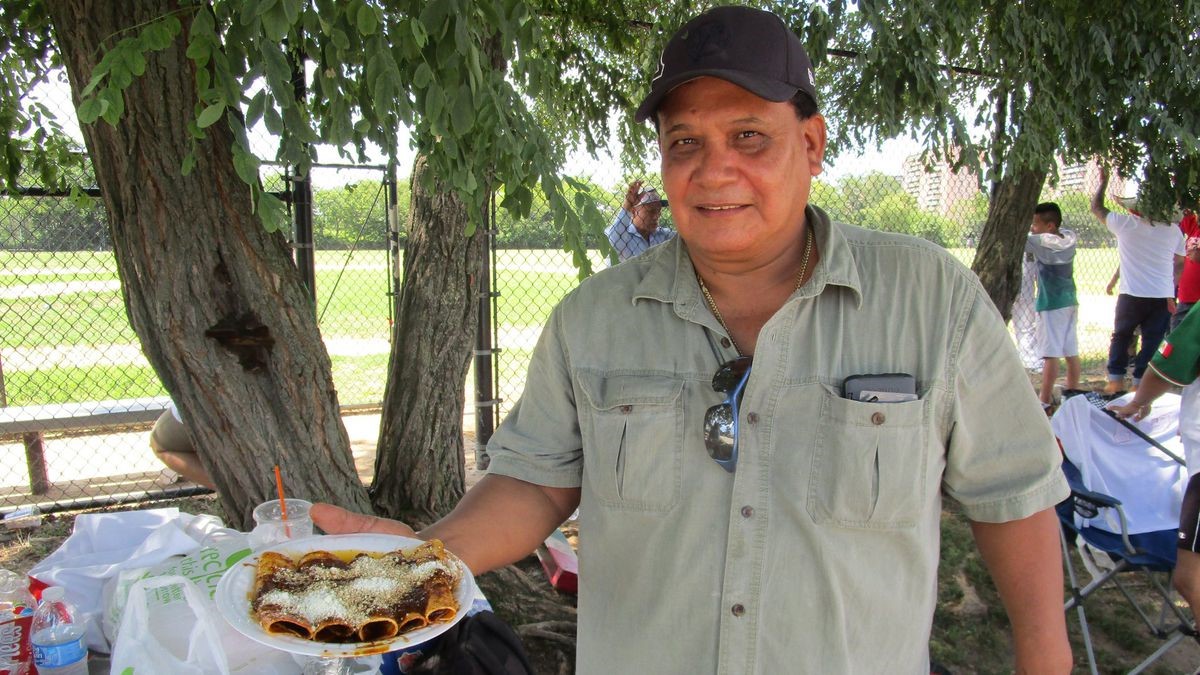
Dispatches, Features, Mexico, North America, United States
Families Struggle to Send Lost Loved Ones Home to Mexico Amid Coronavirus Crisis
July 13, 2020 By rebekahward
This story was originally published on July 9 by THE CITY. Sign up here to get the latest stories from THE CITY delivered to you each morning
This story is part of “MISSING THEM,” THE CITY’s ongoing collaborative project to remember every New Yorker killed by COVID-19. You can participate: If you know someone who died or may have died due to the coronavirus, share their story here or leave us a voicemail at 646-494-1095.
Before she died in late April, 89-year-old Imelda Moreno de Lucero made clear her final wish: to be buried next to her late husband in her small hometown in Puebla, Mexico.
But more than two months after Lucero died at Mount Sinai Beth Israel Hospital due to complications from COVID-19, the body of the loving mother and soccer superfan sits in a cooler at the New York City Office of the Chief Medical Examiner.
Her family has been unable to navigate the difficult logistics of shipping her remains to Mexico or pay the bill, which they were told could run $20,000 or more.
The Mexican consulate is among the few that assists its citizens with repatriation costs, but will only reimburse between $900 and $1,800 in funerary and shipment expenses, according to a consular representative.

Imelda Moreno de Lucero and her husband, Donaciano Lucero. Her family wants to send her to be buried next to him in her hometown (Courtesy of David Lucero).
“All my siblings say, ‘When I die, just cremate me and that’s it.’ But we can’t do that to my mother,” said David Lucero, Imelda Moreno de Lucero’s son. “It’s not in our customs. It is very difficult for us to burn someone.”
The Luceros are among hundreds of New York families who have struggled to send the remains of their loved ones back to their ancestral homes in Mexico, and elsewhere in Latin America — an end-of-life wish made complex, confusing and costly by COVID-19.
Some families started GoFundMe pages to offset the high prices. But extra funds won’t fix the lack of flights to a region whose borders are locked down. And shifting regulations for shipping both bodies and cremated remains overseas have added to the challenges.
Feelings of Frustration
The Mexican consulate tracked 728 pandemic deaths among its citizens in the tri-state area as of the end of June, and estimates that the true number could be even higher.
The largest number of dead come from the state of Puebla, Imelda Moreno de Lucero’s birthplace — which is also the origin of the largest share of the Mexican population in the tri-state area, estimated by the consulate at 1.2 to 1.3 million.
Representatives of the 10,000-member Queens group New Immigrant Community Empowerment, or NICE, say many people have reached out for help since the coronavirus overwhelmed all of New York’s systems in March.
The group’s training director, Nilbia Coyote, who has fielded many of these calls, said the Mexican government has long had a clear process for the repatriation of embalmed remains or ashes of Mexican citizens.
It is one of few consular systems that pays for this service as part of a “protection” program that became oft-used for migrants who died crossing the southern border.
But faced with COVID-19, Coyote said the consulate became much harder to reach. Many Mexican citizens who did get through were told to find alternate ways to coordinate and pay for the shipments with already overwhelmed funeral homes before waiting for partial reimbursement.
Consular authorities said that after being overwhelmed at the height of the coronavirus crisis, they’ve recently been more responsive to requests for aid.
“We ran out of our budget after the first weeks,” Consul for Press and Media Jorge Tuddón Meza told THE CITY. “The Consul General did make a petition to our Ministry of Foreign Affairs in Mexico to request additional funding, which we did receive.”
But for recent migrants, those with less fluency in English or knowledge of New York’s health and funerary systems, trying to send the remains of a lost loved one home themselves in the interim became a particularly trying exercise in frustration.
Funeral Services Scramble
Since the coronavirus pandemic first hit New York, mortuary shipping companies and funeral homes have been scrambling daily to keep up with changing regulations.
Cristian Correa, the chief operating officer of PREXCO: Repatriación Funeraria Multilatina, described the perfect storm that hit his clients when they tried to repatriate the bodies of their loved ones after COVID-19 spread through the city.
“The flights were restricted, the funeral homes were collapsed so they couldn’t do it, and also bodies with COVID-19 weren’t allowed to be shipped,” Correa said, whose company operates its US office out of Queens.
Some countries, Correa noted, closed borders and accepted cargo only for “essential items.” Meanwhile, he said the demand for repatriation services increased tenfold.
Consular authorities clarified that though many locations have rules restricting the shipment of bodies, exceptions have been made.
Pat Marmo, a New York funeral home director who specializes in international cases, said he fielded calls from other funeral home operators who couldn’t reach consulates or figure out the shifting guidelines.
“Information changed on a daily basis,” Marmo said, “so you needed constant contact with the consulates.”
‘A Huge Challenge’
Dave McComb, a former funeral home director who now runs international repatriation and shipping service Inman Shipping, said his business was dependent on the flight paths of commercial air carriers, which cut routes to contain the virus.
“There are some international flights, but that’s very limited,” McComb said. “I would say our capacity dropped over 90% over where we were, probably more like 95%.”
The CDC says there is no inherent risk of COVID-19 transmission from a properly embalmed and cleansed body.
Still, Inman Shipping and its competitors – including Angela Berwald’s National Mortuary Shipping & Cremation – said the body of a COVID-19 patient usually can’t be granted a certificate of non-contagion that most consulates require to ship embalmed remains.
“It’s been a huge challenge to even get the paperwork that’s required to ship internationally right now,” Ohio-based Berwald said. “We have remains that we’ve been holding for weeks.”
She recalls turning down clients from New York City, including one body destined for the Dominican Republic, because the shippers “weren’t going to be able to achieve it.”
Despite traditions, “so many families have opted cremation,” Berwald said. “It’s kind of been forced.”
Changing Plans
The children of Humberto Rodríguez, the 25-year president of the New York Mexican Baseball League, were among the New Yorkers to make the difficult decision to have their father cremated.
Without pandemic complications, the body of the family man who lost his battle to COVID-19 on April 3 would have already been laid to rest in his hometown of San Isidro, Mexico.
Instead, the ashes of the 61-year-old are sitting in his eldest daughter Patricia Rodriguez’s apartment in Brooklyn, surrounded by roses, plaques, family photos and baseball gloves, and presided over by a small crucifix.
She said the death of the baseball aficionado and longtime construction worker was “surprising and unexpected” to his friends, especially those who had seen him at Six Diamonds, in the shadow of Coney Island, just days earlier, fixing pitcher’s mounds and killing weeds.

Patricia Rodriguez set up a memorial in her Brooklyn apartment for her father, Humberto Rodriguez, after he passed away from the coronavirus in early April (Courtesy of Patricia Rodriguez).
In his final public statement for the league, a Facebook Live at the end of last summer’s baseball season, “he was happy, because he was saying he wanted to make the league big again, like before,” Patricia said.
As the virus took an increasing number of league members, its Facebook page became a memorial in its own right, filled with photos of Rodriguez and others who died from the virus. The page includes a slew of links to fundraising pages similar to the one David Lucero created for his mother.
Slipping seamlessly between English and Spanish, Patricia Rodriguez told THE CITY how after her father died, a funeral home representative called her brother Oliver and “told him straight” that though they could embalm the body, they didn’t know how long it would take to send their father back to Mexico.
Instead, she is keeping his ashes at home in Brooklyn until the family can honor his life with a small in-person ceremony at Our Lady of Peace, the Catholic church Rodriguez attended in Park Slope — his neighborhood of 20 years, where he settled in 1987.
With Mexico facing its own surge in COVID-19 cases and deaths and the family’s planned New York City Catholic rites still on hold, Patricia doesn’t expect to be able to send his remains to Mexico until at least the end of August.
“God willing, they can be sent this year, depending what happens,” she said “Because we don’t know if a second wave of the pandemic will come.”
Strong Ties to Tradition
Among the Mexicans living in the New York City area, after Puebla, the most come from Oaxaca, then Guerrero, three states spanning the Mixteca area, according to the city’s consular authority. This area is tied to “strong and respectable” Indigenous traditions as well as devout Catholicism, said NICE’s Coyote.
“There is a high percentage of people who … want to carry out the burial tradition and return the body to the land,” she said.
Coyote said that some NICE members prefered to be buried in New York, which she said was often related to their “migration story.” But when expectations of repatriation are particularly strong, family members have gone to great lengths to find a solution.
One man who came to NICE for support had cremated his brother’s remains in hopes of an easier journey. But with funeral homes asking for thousands of dollars to organize the shipment, he was tempted to take a deal from an acquaintance who offered to carry the ashes in his luggage for under $1,000.
Since this man’s desperate attempts, the Mexican consulate has been able to plan its first repatriation mission since COVID paralyzed such processes months ago.
Consul Tuddón Meza said a Catholic Mass is planned for July 11 at St. Patrick’s Cathedral to honor 220 of New York’s Mexican victims, before sending all of their ashes over the southern border.

St. Patrick’s Cathedral (Virginia Breen/THE CITY).
Meanwhile, some of those with enough resources have made deals with funeral homes to wait until they can ship full bodies.
“Costs are up because of the storage fees funeral homes have to charge. If they have a deceased for two or three months because of flight issues, funeral homes charge for that,” said Matthew Connors, director of operations at Bergen Funeral Home in Brooklyn.
“We have had some families that have entombed their loved ones in mausoleums and plan to exhume them when this whole pandemic is over to ship back home,” he said.
‘Those Things Torment Me’
Pat Marmo of the home International Funeral Service of NY said he is charging a quarter of what he otherwise might for long-term storage, covering his costs as some families play the waiting game.
“I have a family right now that’s trying to get a letter from the doctor, stating that although the cause of death was related to COVID, the person wasn’t positive at the time of death,” he said.
David Lucero, whose mother Imelda is still with the medical examiner, has been cycling through the options with his siblings.

Imelda Moreno de Lucero and her son David (Courtesy of David Lucero).
They have even considered burying her in New York for now, and then exhuming her when the pandemic passes.
“But it would hurt. It hurts a lot to think that my mom would already be resting and then we would again be taking her out of her place,” Lucero said. “I don’t know, all those things torment me.”
THE CITY is an independent, nonprofit news organization dedicated to hard-hitting reporting that serves the people of New York.

